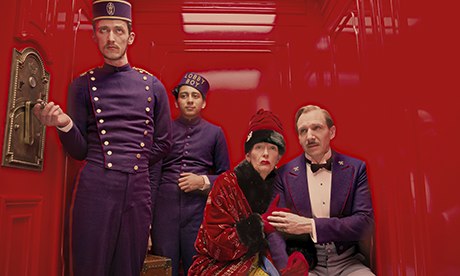Driving home from "The Grand Budapest Hotel," I felt the sneaking suspicion I had just seen Wes Anderson's best film.
Not his most meaningful, mind you, or his most profound, or his most groundbreaking, or even his best. Just his "best." A singular, jubilant distillation of everything that makes him relevant as an artist - the one he's been building to after seven other features. He's long since passed the point in his career where an audience must be wooed to see his movies. You know what an Anderson movie will be. You know if you'll like it. You know if you'll find it insufferable (to those in that camp, I respect you and pity you in equal measure...maybe more like 40/60.)
For us converted, Anderson remains a triumphant from-bottom-to-top filmmaker. Many great directors have a signature style. But for how many can you turn on any random ten-second snippet from a movie and know without a doubt who made it? A Wes Anderson world is a precise, sublime creation, built brick by brick, prop by prop, into a museum housing all his treasured obsessions.
"Obsessions" is an especially apt word to describe his work on "Budapest." From the towering title building exteriors to the individual rooms inside, everything feels gloriously overstuffed, meticulously decorated with signs and objects and people that seem to all merit their own back stories. And surrounding it all, a movie that is somehow all at once a murder mystery, a heist, a prison break, a love story, an at-times gut busting farce, and ultimately a tender mediation on a time long-gone where grace among humanity was the norm, not the exception.
Each of these ideas alone could support an entire film. Together, they threaten to topple the birthday cake. In Anderson's master hands, they're woven seamlessly, creating a giddy, bracingly paced zipline of a movie.
True, "Budapest" and its lead character Gustave (played with committed dapperness by Ralph Fiennes) never quite pierces the cartoon shell it envelopes itself in, as "The Royal Tenenbaums" created a towering eccentricity with Gene Hackman before ultimately revealing him as someone with honest human drives pounding beneath. If the surface of an Anderson movie feels unbearably twee to the untrained eye, he effectively counterbalances that with real, lingering melancholy. "Budapest" often finds itself a little too enamored with the bric-a-brac, resting most of the responsibility for poignancy on the shoulders of a bona fide supporting character played by F. Murray Abraham.
But god, as bric-a-brac goes, can you do much better? Each shot reflects such loving care, each line of dialogue bubbles with such hilarious specificity. Anderson structures "Budapest" like a Russian doll, multiples layers of storytelling buried within. We open with a teenage girl in the present day reading a memoir penned by someone known only as The Author (Jude Law), who tells of visiting the Grand Budapest Hotel in 1968 as it falls on hard times and meeting its owner Zero (Abraham) who then relays how he came to own the hotel in 1932 as a lowly lobby boy under the tutelage of Gustave, the concierge. Anderson shoots each of these periods in a different aspect ratio, while at the same time employing an unprecedented (for him) level of artifice in creating his world (the hotel's exterior in particular looks so blatantly like a model to the point of drawing chuckles).
Such moves initially come as oddly show-offy. Remember the unnecessary animation in "Life Aquatic"? As "Budapest" progresses, though, there reveals method in the madness. If Anderson's movies come chock full of whimsy, it's whimsy without the cream and sugar. Whimsy designed to mask an undercurrent of sadness. "Budapest" deals with people constantly looking back, nostalgic for times that have either gone away or never existed. Sometimes we accept that the world we live in is different from the world we desire. Other times we lie to ourselves. Zero remembers Gustave as a man of impeccable tact, yet in the flashbacks, we see lurking shades of a philanderer and an opportunist.
That is why the blatant artifice of "Budapest" (and Anderson's work in general) becomes so important. Just because we recognize the sadness around us doesn't mean we have to accept it. Isn't it more fun to create our own fantasy version of the truth, if only for a little while?
This throughline of Anderson's filmography culminates in "Budapest," a movie that only appears to approach the brink of overindulgence. At this point in his already remarkable career, Anderson arrives in full command of his craft, wielding the tools of filmmaking itself like a wizard uses his wand.
"The Grand Budapest Hotel" is the lightest, fluffiest, goofiest movie in his catalog (hello matte drawings, how I've missed you). It's also a gem. Thanks to Anderson for proving those two things need not be mutually exclusive.
